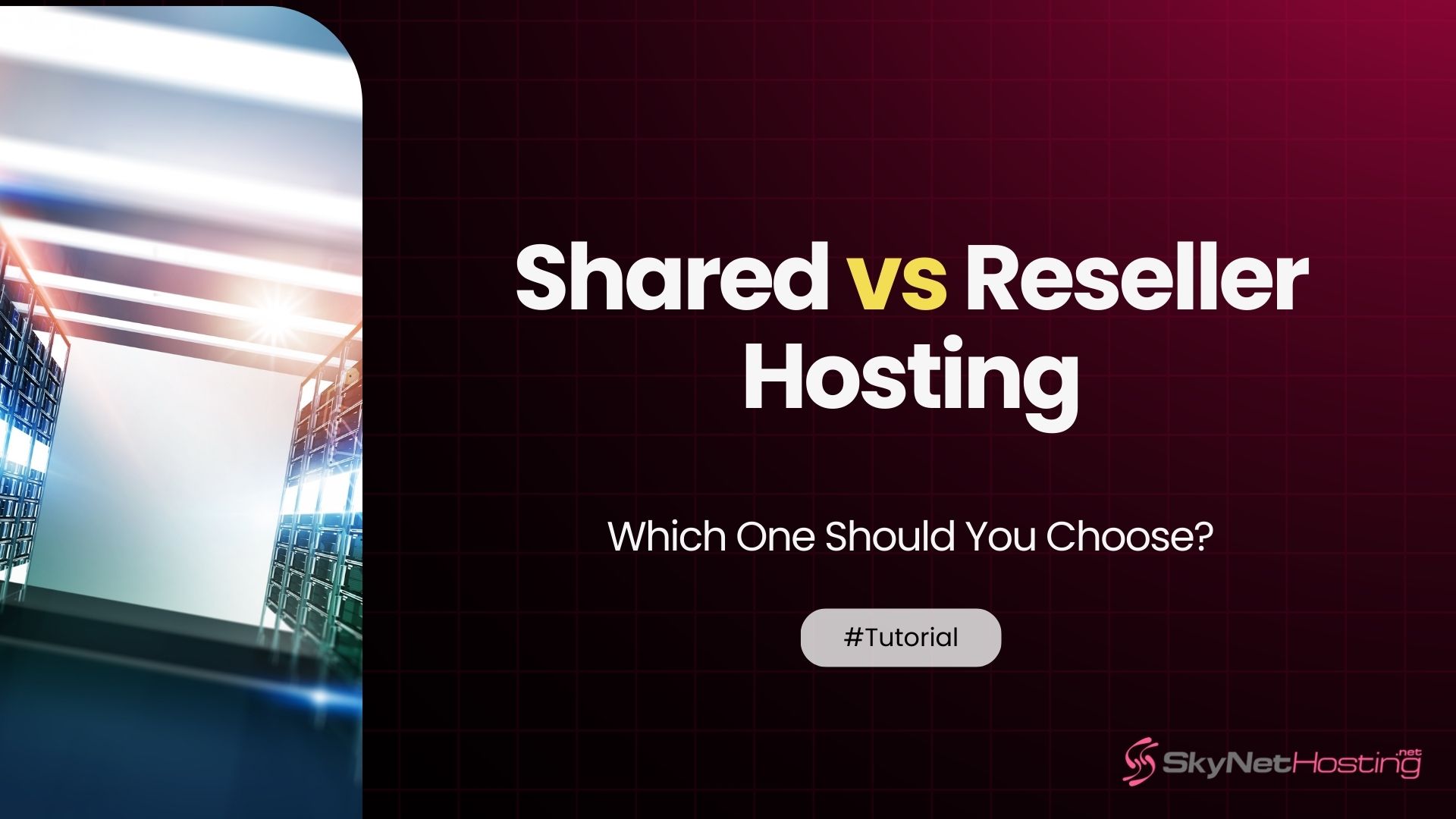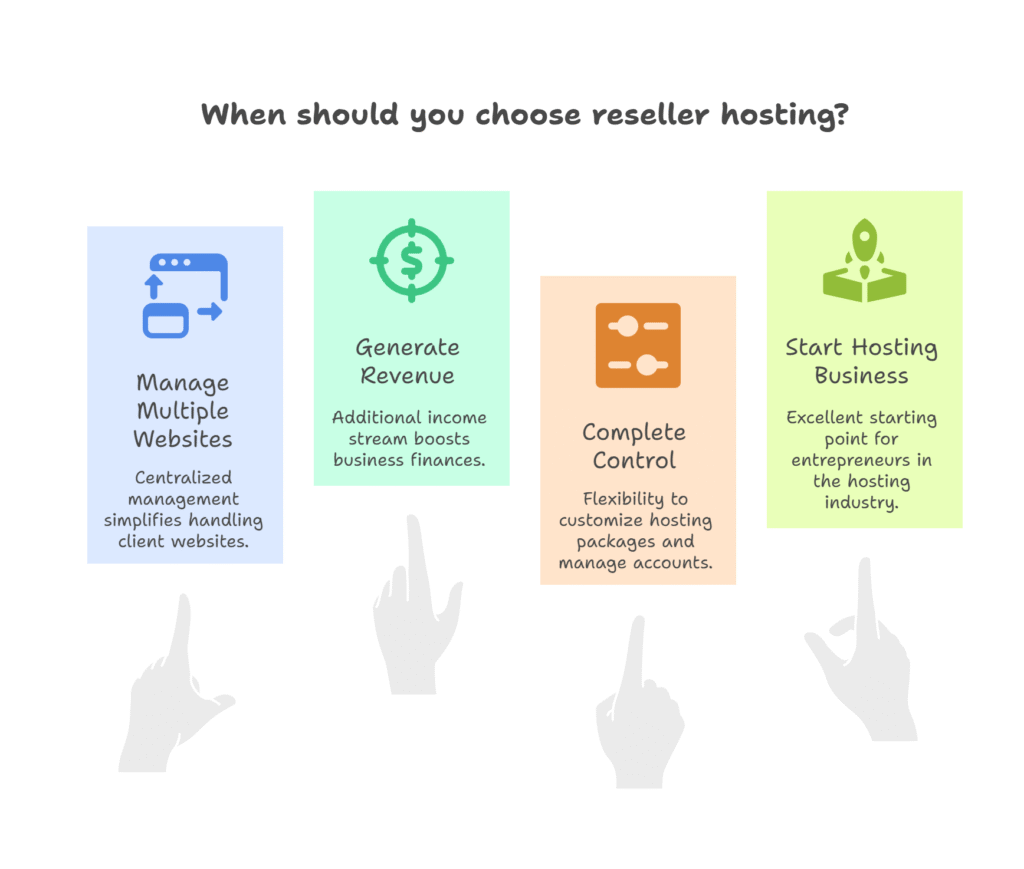
Shared vs Reseller Hosting in 2026: Which One Should You Choose?
TL;DR:
- Shared hosting is cost-effective and best suited for individuals or small businesses with single websites that need a simple, low-maintenance hosting solution.
- Reseller hosting is ideal for freelancers, web developers, or agencies wanting to manage multiple client websites or start a hosting business under their own brand.
- Shared hosting offers ease of use and affordability, while reseller hosting provides greater control, scalability, and potential for profit.
- Shared plans give one cPanel account with limited access; reseller plans include WHM access, multiple cPanel accounts, and client management tools like WHMCS.
- Shared hosting has lower costs ($3–10/month) but fewer resources and scalability; reseller hosting costs more ($15–50/month) but allows revenue generation and greater customization.
- SkyNetHosting.net supports both options with fast NVMe SSD storage, global servers, 24/7 support, free SSL, WHMCS, and white-label features ideal for resellers.
Selecting the right hosting solution can make or break your online presence. With over 1.13 billion websites competing for attention globally, your hosting choice directly impacts site performance, user experience, and business growth potential.
For freelancers, developers, and small businesses, the decision often comes down to two popular options: shared hosting and reseller hosting. While both serve websites effectively, they cater to vastly different needs and goals.
This comprehensive guide will help you understand the key differences between shared hosting vs reseller hosting, explore their unique advantages, and determine which option aligns best with your specific requirements and budget.
What Is Shared Hosting?
Shared hosting is like living in an apartment building where multiple tenants share common resources. Your website lives on a server alongside hundreds or thousands of other websites, all sharing the same server resources including CPU, RAM, and storage space.
How Shared Hosting Works
When you purchase shared hosting, your hosting provider allocates a portion of server resources to your website. The web hosting company manages all server maintenance, security updates, and technical configurations. You simply upload your website files and focus on creating content.
Most shared hosting plans include:
- Pre-installed content management systems (WordPress, Joomla, Drupal)
- User-friendly control panels (cPanel or similar)
- Email accounts with your domain name
- SSL certificates for security
- Automatic backups
Who Should Consider Shared Hosting?
Shared hosting works perfectly for:
- Personal blogs and portfolio websites with moderate traffic
- Small business websites requiring basic functionality
- Beginners who want hassle-free hosting without technical complexity
- Budget-conscious users seeking affordable web hosting solutions
According to recent industry data, 75% of small businesses choose shared hosting for their initial web presence, making it the most popular hosting type for new websites.
What Is Reseller Hosting?
Reseller hosting transforms you from a hosting customer into a hosting provider. You purchase a large hosting package from a provider, then divide and sell smaller hosting packages to your own clients under your brand name.
How Reseller Hosting Works
With reseller hosting, you receive:
- WHM (Web Host Manager) access to create and manage client accounts
- White-label hosting that appears to come from your company
- WHMCS integration for automated billing and customer management
- Multiple cPanel accounts for each client you host
The process is straightforward: you buy hosting space in bulk, create individual hosting packages, and sell them to clients while providing support and account management.
Who Should Consider Reseller Hosting?
Reseller hosting is ideal for:
- Web designers and developers managing multiple client websites
- Digital agencies offering comprehensive web services
- Entrepreneurs wanting to start their own hosting business
- IT consultants providing ongoing website maintenance
Industry statistics show that 68% of web development agencies use reseller hosting to maintain better control over their clients’ websites and generate additional revenue streams.
Key Differences Between Shared and Reseller Hosting
Understanding these fundamental differences will help you make an informed decision:
Account Access & Control
Shared Hosting: You receive one cPanel account with limited administrative access. Server settings and configurations are managed by your hosting provider.
Reseller Hosting: You get WHM access to create unlimited cPanel accounts, set resource limits, and manage multiple client websites independently.
Scalability Options
Shared Hosting: Scaling typically requires upgrading to a higher-tier shared plan or migrating to VPS hosting.
Reseller Hosting: You can easily create new hosting accounts for additional clients without changing your main hosting package.
Revenue Potential
Shared Hosting: Represents a business expense with no direct revenue generation.
Reseller Hosting: Creates an additional income stream by selling hosting services to clients.
Management Responsibilities
Shared Hosting: Minimal management required – focus on your website content and marketing.
Reseller Hosting: Includes client support, account management, and basic technical troubleshooting.
Pros and Cons of Shared Hosting
Advantages of Shared Hosting
Cost-Effective Solution: Shared hosting plans typically cost $3-10 per month, making them extremely budget-friendly for individuals and small businesses.
Easy Setup and Management: Most providers offer one-click installations for popular applications like WordPress, eliminating technical complexity.
Professional Support: Hosting companies provide 24/7 technical support, handling server maintenance, security updates, and troubleshooting.
Beginner-Friendly: No technical expertise required – perfect for users who want to focus on content creation rather than server management.
Disadvantages of Shared Hosting
Limited Resources: Server resources are shared among all websites, potentially causing performance issues during traffic spikes.
Less Control: Restricted access to server configurations and advanced settings.
Security Concerns: If one website on the shared server gets compromised, it could potentially affect other sites.
Scalability Limitations: Growing websites may quickly outgrow shared hosting capabilities.
Pros and Cons of Reseller Hosting
Advantages of Reseller Hosting
Multiple Client Management: Host and manage numerous client websites from a single control panel.
Revenue Generation: Create an additional income stream by selling hosting services to clients.
White-Label Branding: Provide hosting services under your own company name and branding.
Better Resource Allocation: Distribute server resources among your clients based on their specific needs.
Enhanced Control: Full access to create, modify, and manage hosting accounts independently.
Disadvantages of Reseller Hosting
Higher Responsibility: You become the first line of support for your clients’ hosting issues.
Technical Knowledge Required: Basic understanding of hosting management and troubleshooting is necessary.
Time Investment: Managing multiple client accounts requires ongoing attention and support.
Higher Initial Cost: Reseller hosting packages typically cost $15-50 per month, representing a larger upfront investment.
When to Choose Shared Hosting
Select shared hosting when:
You’re Running a Personal Website
Bloggers, freelancers, and individuals showcasing portfolios benefit from shared hosting’s simplicity and affordability. Personal websites typically receive modest traffic levels that shared hosting handles efficiently.
You’re a Small Business Owner
Small businesses with basic website needs find shared hosting perfectly adequate. According to Small Business Trends, 64% of small businesses spend less than $1,000 annually on web hosting, making shared hosting an ideal choice.
You’re New to Website Management
Beginners appreciate shared hosting’s user-friendly interface and comprehensive support. The learning curve is minimal, allowing you to focus on content creation and business development.
Budget is a Primary Concern
Shared hosting provides professional web hosting capabilities at budget-friendly prices. For businesses allocating limited resources to web presence, shared hosting delivers excellent value.
When to Choose Reseller Hosting

Choose reseller hosting when:
You Manage Multiple Client Websites
Web designers and developers benefit significantly from reseller hosting’s centralized management capabilities. Instead of managing separate hosting accounts with different providers, you can control all client websites from one dashboard.
You Want to Generate Additional Revenue
Digital agencies report earning $500-2,000 monthly from reseller hosting services. This additional revenue stream can significantly boost your business income.
You Prefer Complete Control
Reseller hosting provides the flexibility to customize hosting packages, set resource limits, and manage client accounts according to your specific requirements.
You’re Starting a Hosting Business
Entrepreneurs entering the hosting industry find reseller hosting an excellent starting point. You can test the market, build a client base, and potentially scale to dedicated servers as your business grows.
Why SkynetHosting.net Is Ideal for Both Shared and Reseller Hosting
Shared Hosting Excellence
SkynetHosting.net provides reliable shared hosting solutions with:
- Lightning-fast NVMe SSD storage that’s 900% faster than traditional drives
- LiteSpeed web servers offering 300% faster loading speeds than Apache
- 24/7 customer support with real human technicians
- Free SSL certificates and automated backups
Reseller Hosting Advantages
For reseller hosting, SkynetHosting.net offers:
- Free WHMCS license (valued at $15.95/month) for complete business automation
- 25+ worldwide server locations ensuring optimal performance globally
- White-label hosting with your own branding and domain
- End-user support where their technicians assist your clients directly
- Free domain reseller account to expand your service offerings
With over 20 years of hosting experience and 700,000+ websites hosted across 65 countries, SkynetHosting.net provides the infrastructure and support needed for both individual websites and hosting businesses.
Making the Right Choice for Your Needs
The decision between shared hosting vs reseller hosting ultimately depends on your specific goals, technical comfort level, and business objectives.
Choose shared hosting if you need affordable, hassle-free hosting for personal or small business websites. It’s perfect for users who want reliable hosting without technical complexity or additional responsibilities.
Choose reseller hosting if you manage multiple client websites, want to generate additional revenue, or plan to start your own hosting business. The initial investment and learning curve pay off through increased control and income potential.
Consider your long-term goals when making this decision. Many successful web professionals start with shared hosting to establish their online presence, then transition to reseller hosting as their client base grows.
Ready to launch your hosting solution? Whether you need reliable shared hosting for your website or want to start your own hosting business with reseller hosting, SkynetHosting.net provides the tools, support, and infrastructure to help you succeed.
FAQs
What is shared hosting?
Who should use shared hosting?
Shared hosting suits individuals, freelancers, and small businesses with single websites or moderate traffic. It’s ideal for those needing simplicity, affordability, and hosted management without having to handle complex server configurations themselves.
What is reseller hosting?
Who benefits most from reseller hosting?
Reseller hosting is best for web designers, developers, or agencies managing multiple client websites. It provides central management, branding opportunities, and extra income by letting you offer hosting services directly to clients.
How does shared hosting differ from reseller hosting?
Shared hosting gives you one cPanel with limited control, while reseller hosting includes WHM access for creating multiple cPanel accounts. Reseller hosting supports scalability, revenue generation, and client management, unlike shared hosting.
What are the main advantages of reseller hosting?
Reseller hosting enables multiple client management, white-label branding, and flexible resource allocation. It also creates revenue potential and enhanced control for businesses wanting to provide hosting alongside their digital services.



